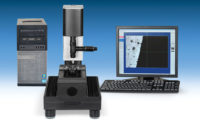The National Institute of Standards and Technology (NIST) is participating in a worldwide effort to recommend major revisions to the International System of Units (SI), the modern metric system that is the basis of global measurements in commerce, science and other aspects of everyday life. The new SI, which would be based on seven constants of nature, would enable researchers around the world to express the results of measurements at new levels of consistency and accuracy.
The most significant change in the possible future revision of the SI would be in the kilogram, the only one of the SI’s seven base units still defined in terms of a material artifact: a 130-year-old platinum-iridium cylinder maintained at the International Bureau of Weights and Measures in France. The kilogram artifact poses long-term problems because its mass changes slightly over time. The proposed revision “puts the SI on a firm foundation,” says Ambler Thompson, a NIST scientist involved in the international effort. In doing so, “We get rid of the last artifact.”
The new SI would specify agreed-upon values of the seven constants, according to the results of an analysis published by the Committee on Data for Science and Technology. Fixed values of constants would then define all base units.
The Consultative Committee for Units, of which NIST is a member and which is one of 10 advisory committees of the International Committee for Weights and Measures (CIPM), submitted a draft resolution for a revised SI for consideration by the CIPM during its meeting in Paris, France, earlier this month. The CIPM, approved the draft and will soon submit the resolution for consideration at the General Conference on Weights and Measures.
If the resolution passes and all the technical requirements are in place, a new SI could be in practice later in the decade.
Get our new eMagazine delivered to your inbox every month.
Stay in the know with Quality’s comprehensive coverage of the manufacturing and metrology industries.
SIGN UP TODAY!Copyright ©2024. All Rights Reserved BNP Media.
Design, CMS, Hosting & Web Development :: ePublishing


